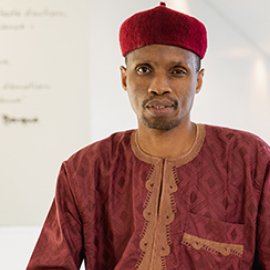University of Maroua

Octobre 2020 à Juin 2021
Ahmadou Séhou is of Cameroonian nationality. He is a Senior lecturer and researcher in political and social history at the University of Maroua. His works focuses on the history of slavery, the slave trade and their memories in African, Atlantic and Islamic contexts. He is the author of several articles and chapters of published works and of a political essay entitled Cameroon, the opposition broken down: critical autopsy and proposals for revival. He participates in the European project Slavery in Africa: a dialogue between Europe and Africa (Slafnet-Rise H2017-2020). He is an associate member of the International Association of the Rings of Memory with which he has carried out several studies on tourism around sites of memory. He is a member of the African Center for Research on the Slave trade and Slavery (CARTE-UCAD / Dakar), also founder and coordinator of the Center for Multidisciplinary Studies and Research on Slavery and Slave trade in Africa (CERPETA-Cameroon).
Slavery and the Slave trade in Cameroon (15th - 20th century): internal dynamics, external connections and memory challenges
This research project focuses on the history of Slavery and the Slave trade in Cameroonian space, this region which stands out in a triangle that goes from the Atlantic coast to Lake Chad and river Ubangi, between the Fiftieth and the Twentieth century. Its originality resides in the lived experience of internal Slave trade and its connections to export Slave trade routes, via the Atlantic from the south and via the Sahara from the north. It aims to highlight a space of front and slave frontiers which has supplied all other Slave trades. It reverses the dynamics of reading Slavery and the Slave trade, from coastal outlets, to resituate and restore the places of origin, where the local strategies of the system operate and are developed, before their connection in merchant networks and circuits. It also incorporates more contemporary aspects on survival and valorization issues, through the identification of heritage and legacies linked to this past, the irruption in the public sphere of conflicting memories, the telescoping or superposition between memory of slavery and colonial memory on certain symbolic sites. Cameroon of today thus appears as a laboratory to (re) think the slave system as a whole through the heritage of a history as well internal as international, spanning the Atlantic ocean and the Sahara desert, connecting Africa, Asia, Europe and the Americas; finally the current socio-political weaknesses and the security crisis of postcolonial states such as Cameroon, Chad, CAR and Nigeria, heirs of a common habit of slave violence, politico-ethnic disintegrations and regular surges of religious extremism, on a background of abandonment of the margins or the peripheries by the central authorities.